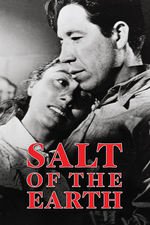Salt of the Earth (1954)
November 21, 2015 6:32 PM - Subscribe
Mexican workers at a Zinc mine call a general strike. It is only through the solidarity of the workers, and importantly the indomitable resolve of their wives, mothers and daughters, that they eventually triumph.
Movie available here.
Some background about the film:
IMDB
AFI
NYTimes review
(Apologies for posting this a bit early, but I have some free time now and will be busy during the week.)
Movie available here.
Some background about the film:
When director Elia Kazan’s On the Waterfront opened in 1954, critics and audiences hailed the gritty movie about Hoboken dockworkers and applauded Marlon Brando’s performance as the ex-boxer who ‘coulda been a contender.’ At the next Academy Awards ceremony, On the Waterfront won Oscars for best film, best director, best actor, and best supporting actress.Wikipedia says:
Another movie about beleaguered workers opened to quite a different reception that same year. Like Kazan’s film, Salt of the Earth was based on an actual situation, in this case a mining strike in New Mexico. Both movies were shot on location with the participation of those who had lived the real stories. And both movies shared a history in the Hollywood blacklist. There the similarities ended. Kazan and his writer, Budd Schulberg, had both named names — identified movie people they said were Communists — when questioned by the House Un-American Activities Committee (HUAC). Some saw their movie, in which Brando’s character testifies against the racketeers who run the docks, as an allegory in support of informing. The people behind Salt, in contrast, were unrepentant blacklistees whose leftist political affiliations derailed their careers during the Red scares of the 1950s. On the Waterfront was a hit and is remembered as a classic film. The makers of Salt of the Earth struggled to find theater owners willing to show their incendiary movie.
The film was denounced by the United States House of Representatives for its communist sympathies, and the FBI investigated the film's financing. The American Legion called for a nationwide boycott of the film. Film-processing labs were told not to work on Salt of the Earth and unionized projectionists were instructed not to show it. After its opening night in New York City, the film languished for 10 years because all but 12 theaters in the country refused to screen it.Rotten Tomatoes
By one journalist's account: "During the course of production in New Mexico in 1953, the trade press denounced it as a subversive plot, anti-Communist vigilantes fired rifle shots at the set, the film's leading lady Rosaura Revueltas was deported to Mexico, and from time to time a small airplane buzzed noisily overhead ... The film, edited in secret, was stored for safekeeping in an anonymous wooden shack in Los Angeles."
IMDB
AFI
NYTimes review
(Apologies for posting this a bit early, but I have some free time now and will be busy during the week.)
You are not logged in, either login or create an account to post comments

posted by filthy light thief at 7:10 AM on November 22, 2015